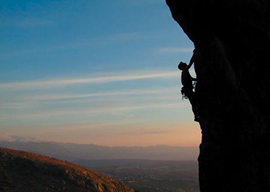
November 15, 2010

The exuberant 127 Hours, Director Danny Boyle’s first movie since winning the Best Picture Oscar for Slumdog Millionaire, is surprisingly comparable to The Social Network.
While 127 Hours is shorter, slighter, and more upbeat, both films are deftly made reconstructions of famous 2003 events within young elite subcultures: Harvard undergrad Mark Zuckerberg founding Facebook and alpinist Aron Ralston walking away from a solo canyoneering accident by amputating his own arm.
Both movies overcome their inherently static situations through showbiz razzmatazz. Aaron Sorkin enlivens a story of typing and giving depositions with snappy dialogue. Boyle employs flashbacks, hallucinations, alternative endings, and his zap-pow digital cinematography to juice up the tale of a man, his hand wedged to a canyon wall by a fallen boulder, contemplating his options. Namely, these options are: somehow survive in a crack in the Utah desert on a liter of water until somebody stumbles upon him; rig a pulley to lift the 800-pound rock; chip the boulder away; perform surgery on himself with a dull knife; or die.
In contrast to the frenetic Slumdog, Boyle offers viewers time to think along with his hero by spreading out Ralston’s discoveries of his options. In truth, Ralston, a mechanical engineer from Carnegie Mellon who”d quit Intel to concentrate on climbing, identified all his possibilities within an hour after his fall. Getting audiences to like the real Ralston’s combination of cold-blooded rationality and recklessness, however, is a more complicated challenge than Boyle chooses to accept.
(In case you are worrying, no, the hero doesn”t spend all 127 hours sawing off his arm. While that took Ralston an hour, Boyle compresses the auto-surgery down to a couple of minutes, with his camera mostly on James Franco’s expressive face.)
Both The Social Network and 127 Hours leave you wondering whether the middle-aged filmmakers, despite their undeniable expertise, truly understand their young subjects. For example, both films” inspirations are more conventionally handsome than the movie stars who portray them. Franco (the kind-hearted dope dealer in Pineapple Express) looks weedy compared to the rugged-jawed Ralston. Boyle’s harsh digital colors and need to shoot with wide-angle lenses in the soundstage mockup of the four-foot-wide canyon slot leaves poor Franco looking pop-eyed and sallow.
These casting choices enable the filmmakers to manipulate audience reactions. The Social Network portrays Zuckerberg as a lonely, angry nerd, even though he strikes programmers and venture capitalists as a natural leader of men. Last week, for example, Google granted all its employees pay raises to keep them from defecting to Team Zuckerberg.